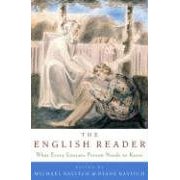This eloquent column from The Minneapolis Star-Tribune discusses some of the issues raised by The English Reader:
Limp Language Leaves Kids with an Awesome Paucity of Speech
By Katherine Kersten, Star Tribune
Eavesdrop on any group of teens hanging around outside your local high school. Their emotions may run the gamut, but their ability to express themselves generally does not. They've got one all-purpose word -- "awesome" -- to cover everything from mild approval to exhilaration. When they're indignant or angry, they have to fall back on clichés -- including a few tired four-letter words.
What accounts for this? Some would say that our kids have grown up on a diet of linguistic Wonder Bread.
If the kids asked us to name a verbal model -- a master of words who could craft a truly stinging insult -- whom would we suggest? Donald Trump?
For my money, nobody dissed 'em better than William Shakespeare. The unparalleled master of the English tongue may have lived 400 years ago, but he made name-calling an art. Take the words he put in Prince Henry's mouth in "Henry IV, Part 1": "Thou clay-brained guts, thou knotty-pated fool, thou whoreson, obscene, greasy tallow-catch!"
Today, teens aren't the only ones who have lost the ability to speak and write with vigor and eloquence. Folks of all ages are reading less -- especially the classics, whose authors wielded our language most powerfully. As a result, our ability to express ourselves is diminishing, because we can't draw on their example for inspiration.
Last month, Diane Ravitch, an eminent historian of education, provided the perfect antidote: "The English Reader: What Every Literate Person Needs to Know." In this anthology, she and her son Michael Ravitch have gathered what they regard as the most memorable speeches, poems, essays and songs in the English language.
"Today, our common cultural reference points come from the visual culture: Britney Spears, Jennifer Lopez," Ravitch told me last week. Our schools could help remedy the problem, but often don't, she says. That's because "'relevance" is now the watchword in education.
In textbooks, teens tend to find countless stories about young people much like themselves, according to Ravitch.
"How much richer it is to be able to use your imagination -- to communicate with people who lived 200 years ago and come away with something that remains in your head and your heart," she adds.
Norman Fruman, an emeritus English professor at the University of Minnesota, agrees. "Good literature deals with ideas, as well as emotions and the psychology of human behavior," he says. "It records our greatest tragedies and our highest aspirations." During 40 years as a teacher, he saw a steep decline in students' knowledge of their literary heritage.
Students' ignorance impoverishes them in several ways, he says.
Fruman illustrates with an anecdote: Years ago, a quiet young woman who always sat in the back row approached him after a class discussion of "The Rime of the Ancient Mariner," a poem by Samuel Taylor Coleridge. "She told me that Coleridge powerfully expressed her own terrifying experiences of depression. 'The words just jumped off the page,' she confided. 'They were speaking to me and recording my experience.' "
Robert Kennedy also drew solace from the classics. After his brother John's assassination, he memorized lines from the Greek playwright Aeschylus about the wisdom that comes through suffering. Ravitch herself lost a child to leukemia in 1966. She has included the poem that sustained her -- "Oak and Lily," by 17th-century writer Ben Jonson -- in "The English Reader."I still can't read it out loud, it moves me too much," she says.
Language has the power to capture intimate emotions, but it can also move entire nations. "The English Reader" includes "words that changed the world, words that inspired revolutions," Ravitch says.
Fruman uses King Henry's great speech at Agincourt in Shakespeare's "Henry V" as an example. "When I hear it, I want to jump up and follow him into battle," he says. Fruman also recalls hearing Winston Churchill's thrilling words on the radio in 1940: "We shall fight on the beaches, we shall fight on the landing grounds, we shall fight in the fields and in the streets, we shall fight in the hills; we shall never surrender." It's no accident that the other great Allied leaders of World War II -- Franklin D. Roosevelt and Charles de Gaulle -- were also great orators, he adds.
The 2002 New York City ceremony marking the first anniversary of the 9/11 terrorist attacks suggested that contemporary leaders know they can't match that standard. Speakers read Lincoln's Gettysburg Address, recited Franklin Roosevelt's Four Freedoms, and quoted from the Declaration of Independence. Not one used his own words.
These speakers were important public figures -- two governors and the mayor of New York City. Apparently, however, they didn't trust themselves to say anything worth remembering.
